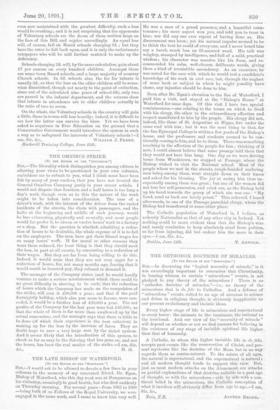THE LATE BISHOP OF WATERFORD.
[To THII EDITOR OF THE "SPECTATOR."]
SIR,—I would ask to be allowed to devote a few lines in your columns to the memory of my venerated friend, Dr. Egan, Bishop of Waterford, who this day week was at Dun garvan on his visitation, seemingly in good health, but who died suddenly on Thursday morning. For several years—from 1882 to 1890 —being both of us Fellows of the Royal University, we were engaged in the same work, and I came to know him very well.
He was a man of a grand presence, and a beautiful coun- tenance; his mere aspect won you, and told you to trust in him; nor did any one ever repent of having done so. His discernment was keen ; yet his natural impulse seemed to be to think the best he could of every one, and I never heard him say a harsh, much less an ill-natured word. His talk was weighty, stamped by intelligence, and full of a mild, practical wisdom; his character was massive like his form, and re- commended his calm, well-chosen, deliberate words, giving them a kind of irresistible ascendency. As an examiner, he was noted for the care with which he would test a candidate's knowledge of his work in viva voce, lest, through the neglect of some book or subject in which he might possibly have shone, any injustice should be done to him.
Soon after Dr. Egan's elevation to the See of Waterford, I paid him a visit, and stayed at the "Bishop's House" at Waterford for some days. Of this visit I have two special reminiscences,—one relating to the terms on which he lived with his clergy, the other to the extraordinary affection and respect manifested to him by the people. His clergy did not, indeed, like those of St. Augustine at Hippo, live under the same roof with him ; but it was the next thing to that, for the fine Episcopal College is within a few yards of the Bishop's house, and the professors and students seemed to be con- tinually coming to him, and he to them. There was something touching in the affection of the people for him ; thinking of it now, I could almost believe that some presage told them that they would not have him long. One day as we were driving home from Woodstown, we stopped at Passage, where the Bishop wished to visit the National school. Most of the people whom we met in the streets, rough-bearded seafaring men being among them, went straight down on their knees and asked for his blessing. The joy at seeing him thus un- expectedly among them was great; but one of the women did not lose her self-possession, and cried out, as the Bishop held up his hand towards the group of which she was one : "My Lord, send us back our lovely priest." This referred, I heard afterwards, to one of the Passage parochial clergy, whom the Bishop had transferred to some other place.
The Catholic population of Waterford is, I believe, as ardently Nationalist as that of any other city in Ireland. Yet nothing could be more evident than that the Bishop's wise and manly resolution to keep absolutely aloof from politics, so far from injuring, did but endear him the more in their eyes.—I am, Sir, Scc.,


































 Previous page
Previous page